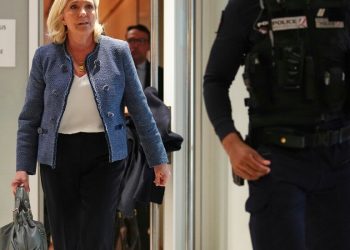
People watch a screen showing South Korean President Yoon Suk Yeol speaking during a televised address at a bus terminal in Seoul on Dec. 12, 2024.
ANTHONY WALLACE/AFP via Getty Images
hide caption
toggle caption
ANTHONY WALLACE/AFP via Getty Images
SEOUL, South Korea — South Korea’s president on Thursday defended his decision to declare martial law last week as an act of governance and denied charges of insurrection.
In an address to the nation, President Yoon Suk Yeol claimed that the opposition-controlled parliament has been destroying the country’s liberal democratic order, repeating the reasons he cited when announcing martial law decree on Dec. 3.
It was the president’s first public account in over a week that detailed his motives and intentions.
During that period of political turmoil, pressure quickly built up around Yoon. Military and government officials voiced incriminating allegations against him. Hundreds of thousands of protesters spilled out onto the streets. Investigators probing his insurrection charges raided his office and expressed willingness to arrest him.
The main opposition Democratic Party, which vowed to introduce impeachment bills against the president every week after the first effort failed due to the ruling party’s boycott, filed a second motion on Thursday. And a growing number of ruling party lawmakers now vow to support it.

In his speech on Thursday, Yoon, a former chief prosecutor, attempted to justify his action and downplay its significance.
He argued that the opposition’s “legislative dictatorship” paralyzed state affairs and disturbed social order.
South Korea’s constitution says a president can enforce martial law “to maintain public safety and order … in time of war, armed conflict or similar national emergency.”
The constitution, however, doesn’t state that martial law can limit activities of the National Assembly.
Yoon also asserted that his decision was merely an “emergency measure … in the form of martial law” intended to warn the public about the “current crisis” and restore constitutional order, adding it’s different from past martial-law decrees issued under military dictators.
He said he only dispatched a small number of troops to the National Assembly as a “symbolic” gesture and for maintenance of order. He claimed he did not order the forces to block lawmakers’ entry. “It is evident that the intention wasn’t to disband the parliament or paralyze its functions,” he said.

Demonstrators from a labour group take part in a protest calling for the ouster of South Korea President Yoon Suk Yeol outside City Hall in Seoul on Dec. 12, 2024.
ANTHONY WALLACE/AFP via Getty Images
hide caption
toggle caption
ANTHONY WALLACE/AFP via Getty Images
Testimonies from officials mobilized to execute martial law, however, contradict Yoon’s claims. Lt. General Kwak Jong-keun, the then-commander of the Army Special Warfare Command, told the parliament this week that Yoon directly ordered him to “break down the doors” of the parliament and “drag people out.”
Many lawmakers have said that they were blocked from going into the parliament and thus from voting to lift martial law.
Using violence to incapacitate constitutional government bodies constitutes insurrection under South Korea’s criminal law. And a leader of an insurrection can be punished with the death penalty, or life in prison.
Concluding his speech, Yoon vowed to “proudly stand up to” impeachment and investigation and to not avoid legal or political responsibility related to his decision.
But he also argued that his action was an “act of governance” within a president’s legal power and should not be subjected to judicial judgment.
Yoon’s speech was met with immediate condemnation at the parliament. Lawmaker Kim Min-seok, who chairs the opposition Democratic Party’s special committee on the martial law crisis, said it reveals the president’s “extreme delusion” and amounts to “a declaration of war against the people.”

Han Dong-hoon, the leader of the ruling People Power Party (PPP), who had criticized the martial law decree but shied away from urging Yoon’s impeachment, reversed his position following the speech. Han said Yoon “practically confessed to an insurrection” and called on the party’s ethics committee to expel the president from the party.
But PPP’s newly elected floor leader Kweon Seong-dong, who has been more supportive of the Yoon administration than Han, said the party line is still against impeaching Yoon.
Still, after Yoon’s national address, two PPP lawmakers announced their support for impeachment, joining five others who had already made the pledge.
The impeachment motion will be put to a vote on Saturday. It needs eight votes from PPP to pass.




















